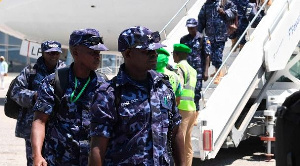Less than 20 months before the African Union Transition Mission in Somalia formally exits the stage, officials in Mogadishu say they are willing to prolong the stay of the regional force, signaling the challenge of beating down Al-Shabaab.
The East African has learned that Mogadishu has launched shuttle diplomacy to lobby the international community and influential leaders in the region to agree to the extension, a move likely to bring in consequences ranging from sustainability and mandate of the Mission.
The African Union Peace and Security Council is expected to convene on April 27 to discuss the future of the AU Transition Mission in Somalia (Atmis), following repeated calls and signals that Somali President Hassan Sheikh Mohamud wants the force to stay beyond its December 31, 2024, exit date. The initial plan was for the draw-down to begin in June and be completed by December next year.
Nothing concrete yet
But a source close to the peacekeeping mission told The EastAfrican the proposal to extend the tenure of Atmis “has been mooted” but there is nothing concrete yet as the idea is “still in the corridors” of the Federal Government of Somalia leaders and some other stakeholders that Mogadishu has reached out to.
Uganda People’s Defence Force Spokesperson Brig-Gen Felix Kulayigye said he supports the Somali president’s efforts to lobby for a longer stay for the force that has been deployed in the deadly conflict for the last 15 years, battling al-Shabaab militants.
“President Hassan Sheikh Mohamud is right,” Brig-Gen Kulayigye said. The UPDF contingent forms the bulk of the Atmis force, manning the security of the Banadir region, which hosts the Somali capital Mogadishu.
Analysts argue that the calls for a new exit date arise out of the reality that Somalia has not built and equipped its security forces to deal with defending the fragile country that has been in continuous conflict since 1991.
Consistent with exit plan
The proposal, which seeks to keep Atmis in Somalia for at least another two years, is consistent with the exit plan that was initially floated by nearly all the troop-contributing countries (TCCs) in late 2021 when the force was being reconfigured to its current mandate of a transition mission from the African Union Mission in Somalia (Amisom).
The TCCs proposed a five-year transition period, during which institutions of the Federal Government of Somalia would gradually take up all the security functions, but the UN Security Council and the European Union agreed to a total of 32 months, counting from April 2022.
The plan favored by the TCCs was to exit in 2026, but this was subject to endorsement by international community partners with financial muscle, like the EU, the United Kingdom, and the United Nations who fund the mission which they have so far sunk upwards of $3 billion since 2007.
Of this, the EU alone has given total support totaling $2.74 billion for both Atmis and its predecessor, the African Union Mission in Somalia (Amisom) to cover allowances for troops from Uganda, Kenya, Burundi, Ethiopia, and Djibouti.
Prioritise peace
Last month, Uganda President Yoweri Museveni told his Somali counterpart Sheikh Mohamud to prioritize peace by building “a people’s national army” with the correct ideology of defending their country for peace to prevail.
This was during a meeting at State House Entebbe on March 19, when the Somali president was in Uganda to witness the passing out of 2,900 trainees for the Somali National Army who successfully concluded their four-month special Basic Military Training at the Special Mission Training Centre in Butiaba, Buliisa District.
This, Sheikh Mohamud said is part of the transition efforts for Somalia to train and recruit at least 24,000 soldiers by December 2024 to take over from Atmis, which is currently sharing security duties with the Somali National Army, while completely ceding control of others to the local military and police personnel.
Training military and police
But other stakeholders, led by the EU, have recently voiced concerns that not enough is being done by the international community, to complete Somalia’s transition, which includes building the security forces, which includes training and equipping the military and police personnel.
Besides security, other reforms that need the support of donors to deliver a full transition include state-building efforts that involve participation in the national consultative council in May, which will deliberate an electoral model, expand political participation, and move away from the ad hoc decision-making forums.
“This would be a significant milestone in the state-building process and the EU remains committed to support,” said Dr. Annette Weber, the EU Special Representative for the Horn of Africa, during the UN Security Council Private Meeting on Somalia on March 27.
 Home Of Ghana News Ghana News, Entertainment And More
Home Of Ghana News Ghana News, Entertainment And More




